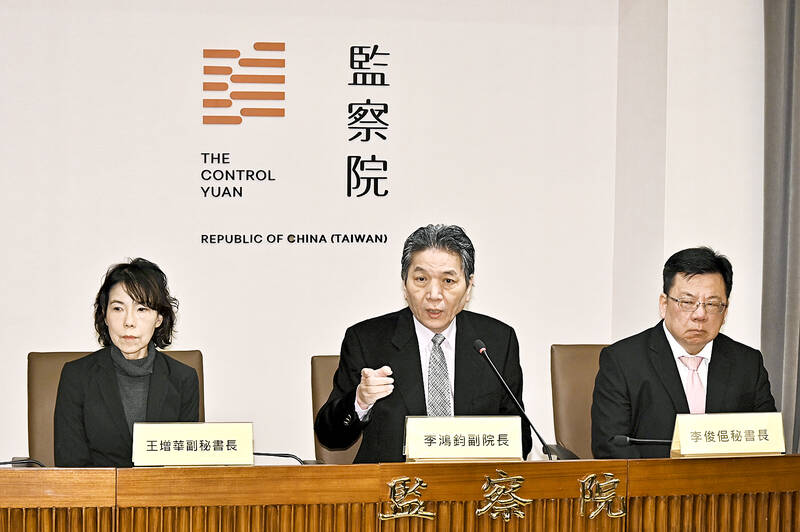The Taipei Times last week reported that the Control Yuan said it had been “left with no choice” but to ask the Constitutional Court to rule on the constitutionality of the central government budget, which left it without a budget. Lost in the outrage over the cuts to defense and to the Constitutional Court were the cuts to the Control Yuan, whose operating budget was slashed by 96 percent. It is unable even to pay its utility bills, and in the press conference it convened on the issue, said that its department directors were paying out of pocket for gasoline expenses.
CRIPPLING OVERSIGHT
The attack on the Control Yuan, a branch of government which, like the Constitutional Court, is tasked with oversight functions, is an indicator of how the legislative coup organized by the Chinese Nationalist Party (KMT) and the Taiwan People’s Party (TPP), the two China-aligned parties, is not about saving money, but about crippling government and its oversight functions.

Photo: Tu Chien-jung, Taipei Times
The legislators may also have been seeking to punish it for doing its job. Last week the Control Yuan confiscated NT$55.8 million (US$1.69 million) from Ko Wen-je (柯文哲), the former Taiwan People’s Party’s (TPP) chairman and presidential candidate.
The Control Yuan statement also said that the Anti-Corruption Committee additionally fined Ko NT$3.74 million, under the Administrative Penalty Act (行政罰法).
Although the seizure and the fine were separate from the Taipei District Prosecutors’ Office’s criminal charges against Ko, the prosecutors turned over evidence to the Control Yuan for the investigation, which began in August last year.

Photo: Tu Chien-jung, Taipei Times
The TPP argued that, since the fines were executed the day before Ko was to appear in court for the first time, they must be politically motivated.
The attack on the Control Yuan naturally highlights the issue of whether it should be eliminated, something that has been under public discussion for over a decade. In fact, last May Huang Kuo-chang (黃國昌) the then-caucus whip for the TPP and now its chairman, said that the party had signed onto a constitutional amendment to eliminate the Control Yuan, one of the five branches of government under the clunky Republic of China (ROC) constitution. At that time the KMT did not support it.
Cynics may conclude that the TPP was attempting to sterilize potential oversight of its shenanigans, but readers may recall that the Control Yuan has long been the target of attempts to eliminate it, attempts which have widespread public support, underpinned by accusations of political patronage and cronyism.
Former president Ma Ying-jeou’s (馬英九) Control Yuan president, Wang Chien-shien (王建煊), on several occasions called for its abolition (Wang founded the New Party and staged a forgettable presidential run on a pro-unification platform last year).
During the Ma years, observers complained the Control Yuan had become useless. When the Democratic Progressive Party’s (DPP) Chen Shui-bian (陳水扁) began his second term as president, the KMT-controlled legislature boycotted Chen’s candidates for the Control Yuan, rendering it non-functional for most of his second term.
Note that the reason former president Tsai Ing-wen (蔡英文) did not repeat the experience of the Chen presidency is because the DPP controlled the legislature. Now that the DPP does not control the legislature, the KMT is redeploying the tactics it used against Chen.
When Tsai became president in 2020 she appointed Chen Chu (陳菊) Control Yuan president. Chen Chu then averred that she would be the last Control Yuan president. Tsai also called for convening a cross-party legislative commission to eliminate it. Despite this, the legislature approved Tsai’s nominees and it continued.
Later Tsai grafted the National Human Rights Commission onto the Control Yuan. The commission could only make reports and recommendations, and had no punishment powers when first established. At present it is treated as a commission like the Anti-Corruption Commission, its membership composed of Control Yuan members.
CHECKS AND BALANCES?
Chen Chu once said that the Control Yuan existed to provide checks and balances to the judicial branch. Given that interpretation of its powers, it is obvious that if the goal of actors is to eviscerate governance in Taiwan, the Control Yuan must be eliminated, since it complements the judicial branch. That is why its operating budget for this year was reduced to NT$10 million on a request of NT$240 million (around a miserly US$8 million), shutting down its ability to investigate the cases brought to it.
The fact that the operational budget was slashed indicates the intent of the pro-China parties to destroy the Control Yuan’s ability to act. Because it is defined in the Constitution as a branch of government, it cannot be eliminated without a Constitutional Amendment approved by three-fourths of the legislature. Suspension was the closest the pro-PRC parties could get. But it is easy to see where they are headed.
The current group of 29 Control Yuan members, the 6th Control Yuan, was formally nominated by former president Tsai in June, 2020 and confirmed by the DPP-controlled legislature a month later. Its term expires on July 31 next year. When that happens, the president will nominate another 29 people. If the KMT is not swept from power by the recalls, then it will likely boycott those nominees, once again rendering the Control Yuan non-functional.
Both sides will then draw battle lines, and the question of whether the Control Yuan should be eliminated will be lost in a partisan bloodbath. Yet the public supports elimination. A 2023 poll found that 55.7 percent supported abolishing it, with bipartisan majorities. The public also wants to see the Examination Yuan abolished as well.
Chen Chu supports a constitution with three branches of government, long a goal of pro-democracy activism in Taiwan. A Taipei Times report in June last year said that Chen looks forward to the abolition of the Control Yuan, as long as the legislature follows proper constitutional procedures, Chen said she would “fully support and respect” the decision.
Taiwan’s constitutional amendment process has been famously difficult since the changes implemented in 2005. One-fourth of the members of the Legislative Yuan must initiate the process. Then the amendment must pass the legislature by a three-fourths vote. Then six months later an absolute majority of eligible voters must ratify it in a public referendum. A 2022 referendum on a constitutional amendment lowering the voting age failed. However, a similar effort to eliminate the Control Yuan (and the Examination Yuan) would have a decent shot at success.
A successful constitutional referendum to abolish the two extraneous branches of government would pave the way for future efforts, normalizing a key step in the nation’s democratic development. It would also make the Constitution a more Taiwan-centered artifact.
Notes from Central Taiwan is a column written by long-term resident Michael Turton, who provides incisive commentary informed by three decades of living in and writing about his adoptive country. The views expressed here are his own.

The depressing numbers continue to pile up, like casualty lists after a lost battle. This week, after the government announced the 19th straight month of population decline, the Ministry of the Interior said that Taiwan is expected to lose 6.67 million workers in two waves of retirement over the next 15 years. According to the Ministry of Labor (MOL), Taiwan has a workforce of 11.6 million (as of July). The over-15 population was 20.244 million last year. EARLY RETIREMENT Early retirement is going to make these waves a tsunami. According to the Directorate General of Budget Accounting and Statistics (DGBAS), the

Last week the story of the giant illegal crater dug in Kaohsiung’s Meinong District (美濃) emerged into the public consciousness. The site was used for sand and gravel extraction, and then filled with construction waste. Locals referred to it sardonically as the “Meinong Grand Canyon,” according to media reports, because it was 2 hectares in length and 10 meters deep. The land involved included both state-owned and local farm land. Local media said that the site had generated NT$300 million in profits, against fines of a few million and the loss of some excavators. OFFICIAL CORRUPTION? The site had been seized

Next week, candidates will officially register to run for chair of the Chinese Nationalist Party (KMT). By the end of Friday, we will know who has registered for the Oct. 18 election. The number of declared candidates has been fluctuating daily. Some candidates registering may be disqualified, so the final list may be in flux for weeks. The list of likely candidates ranges from deep blue to deeper blue to deepest blue, bordering on red (pro-Chinese Communist Party, CCP). Unless current Chairman Eric Chu (朱立倫) can be convinced to run for re-election, the party looks likely to shift towards more hardline

Sept. 15 to Sept. 21 A Bhutanese princess caught at Taoyuan Airport with 22 rhino horns — worth about NT$31 million today — might have been just another curious front-page story. But the Sept. 17, 1993 incident came at a sensitive moment. Taiwan, dubbed “Die-wan” by the British conservationist group Environmental Investigation Agency (EIA), was under international fire for being a major hub for rhino horn. Just 10 days earlier, US secretary of the interior Bruce Babbitt had recommended sanctions against Taiwan for its “failure to end its participation in rhinoceros horn trade.” Even though Taiwan had restricted imports since 1985 and enacted